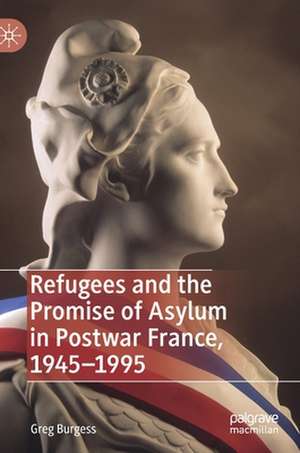Refugees and the Promise of Asylum in Postwar France, 1945–1995
Autor Greg Burgessen Limba Engleză Hardback – 9 oct 2019
Preț: 730.35 lei
Preț vechi: 890.66 lei
-18% Nou
Puncte Express: 1096
Preț estimativ în valută:
139.76€ • 144.40$ • 116.26£
139.76€ • 144.40$ • 116.26£
Carte tipărită la comandă
Livrare economică 19 martie-02 aprilie
Preluare comenzi: 021 569.72.76
Specificații
ISBN-13: 9781137440266
ISBN-10: 1137440260
Pagini: 279
Ilustrații: XIII, 296 p. 1 illus.
Dimensiuni: 148 x 210 mm
Greutate: 0.52 kg
Ediția:2019
Editura: Palgrave Macmillan UK
Colecția Palgrave Macmillan
Locul publicării:London, United Kingdom
ISBN-10: 1137440260
Pagini: 279
Ilustrații: XIII, 296 p. 1 illus.
Dimensiuni: 148 x 210 mm
Greutate: 0.52 kg
Ediția:2019
Editura: Palgrave Macmillan UK
Colecția Palgrave Macmillan
Locul publicării:London, United Kingdom
Cuprins
Chapter 1. Introduction: The Promise of Asylum.- Chapter 2. The Post-War Convergence - Population, Immigration, Refugees, 1944-1945.- Chapter 3. Refugees, Deportees and Repatriates after 1944.- Chapter 4. The 'Neo Refugees'' of Spain and the East.- Chapter 5. The Refugee Convention and a Law on Asylum, 1951-1952.- Chapter 6. The OFPRA and its refugees, 1952-1960.- Chapter 7. The Crossroads of the 1960s. A Retreat for Humanitarian Asylum.- Chapter 8. Exiles, Repatriates, and Refuges without the Name.- Chapter 9. Asylum in Crisis.
Notă biografică
Greg Burgess teaches modern and contemporary History at Deakin University, Australia. His research specializes in the history of refugee movements and political responses to them in nineteenth and twentieth-century Europe, with particular attention to France. His previous publications include Refugee in the Land of Liberty: France and its Refugees, from the Revolution to the End of Asylum, 1787-1939 (Palgrave, 2008), and The League of Nations and the Refugees from Nazi Germany: James G. McDonald and Hitler’s Victims (2016).
Textul de pe ultima copertă
This book recounts France’s responses to refugees from the liberation of Paris in 1944 to the end of the civil wars in the former Yugoslavia in 1995. It questions whether France fulfilled the promise of asylum for those persecuted for the ‘cause of liberty’ made in its Constitution of 1946. Post-war development and the demand for immigrant workers were favourable to refugees from the Communist east, from Franco’s Spain, from Hungary after insurrection of 1956, and later from Latin America and Indochina. Asylum developed nationally in conjunction with international developments, the interventions of the United Nations High Commissioner for Refugees, and the adoption of the 1951 Refugee Convention. Economic ruptures in the 1970s, however, and the appearance of refugees from Asia and Africa, led to the assertion of national priorities and brought about a sense of crisis, and questions about whether France could continue to fulfil its promise.
Caracteristici
Provides comprehensive historical contexts to the problems surrounding immigration and refugees in recent French history Explores French immigration policy through the use of new archival research Reveals within the international refugee regime the flaw of states enforcing international law in consideration of their own priorities
